News
Pan-African Integration: Museveni Calls for Unified Defense and Markets
He highlighted that in the current state of affairs, coordinating multiple sovereign units is less efficient and less prompt in terms of action

#IvanKaahwaReports
Uganda’s head of state, Yoweri Kaguta Museveni, delivered the State of the Nation address for 2024 before the Parliament of the Republic of Uganda at Kololo Independence Grounds. The President reaffirmed the NRM’s principles, derived from its historical missions, aimed at achieving prosperity both within Uganda and beyond its borders. This article will focus on African Unity, a key theme that dominated the President’s speech.
Museveni stated that since its inception, his government recognized that for Africa to survive and thrive, leaders must ensure prosperity for African people, including Ugandans, strategic security from any threats, and the promotion of African brotherhood. He emphasized that Africans are similar or linked, which would facilitate economic progress more effectively than relying on foreign aid.
Museveni asserted that prosperity stems from each adult engaging in the sustainable production of goods or services and selling them. This involves specializing in specific clusters of products and services, along with being patriotic and nationalistic for prosperity.
In the Ugandan context, Museveni emphasized that socio-economic transformation is realized through four money-making sectors: commercial agriculture, manufacturing, services, and ICT. He noted that the government has provided grants and soft loans to wealth creators as capital to enhance livelihoods.
While aiming to create common markets for Africa, and where possible for the East African Community (EAC) which has registered progress, Museveni highlighted that Africa could be economically prosperous, though it remains vulnerable amidst existing global threats and actors. He suggested that size and development are essential for safeguarding territories, citing the USA, China, India, and Russia as the only countries that have landed on the moon.
Museveni revealed that Uganda is working on implementing a limited space program for overhead observation and communication, broadcasting, and telephone communication. This includes an overhead imaging satellite at an altitude of 600-700 km in space for communication and internet at 36,000 km in space, which shall be shared with other East African countries.
However, he noted that these prospects are not enough to defeat greedy and aggressive parasites who seek dimensions created on land, Airforce, sea-navy, and space forces. This is why African revolutionaries, departed elders, and current predecessors put forward the principle of political integration as an element of the Pan-Africanism principle.
While there is an ideal move to create a common market for Africa, there is also a consideration to create a regional political federation representing a maximum form of integration since the people are similar or compatible, preferably with a common language. This makes East Africa the best candidate for political federation integration. Museveni argued that the neutral dialect of Kiswahili could easily be the official language for a potentially powerful federation of East and Central Africa.
He suggested that this East African federation, with one army, common citizenship, and markets, would provide perpetual insurance for the freedom of the black race and other freedom-loving people in the world, including securing Africa from threats.
He further stated that the integration would enable the region to have a defense capacity to be present on land, sea, air, and space. He noted that the almost successful declaration of the federation in 1963 by leaders like Mwalimu Nyerere, Jomo Kenyatta, and Milton Obote failed due to fragmentation of sovereignty. According to him, this was a mistake of the past that needed to be corrected by the current leadership, hence pushing for the integration of East Africa.
Museveni blamed the failure of this integration for allowing several calamities to occur, including the seizing of power by Idi Amin in Uganda, the 1972 massacres in Burundi, the genocide in Rwanda, the collapse of state authority in Somalia, and the war in Mozambique. He elaborated that a united East African state with one army would have never allowed such insurgencies to happen since it would have been the body to address such problems. He highlighted that in the current state of affairs, coordinating multiple sovereign units is less efficient and less prompt in terms of action.
Museveni emphasized further that prosperity and strategic security are core for unification and that the NRM is trying to unite people who are similar or linked but betrayed by African political classes that continue to preach sectarianism. He boasted how patriotism has been able to unite the majority of Ugandans while Pan-Africanism has revived the EAC, including Rwanda, Kenya, Tanzania, Burundi, DRC, South Sudan, and Somalia, which has eased cross-border trade. #IvanKaahwaReports


































